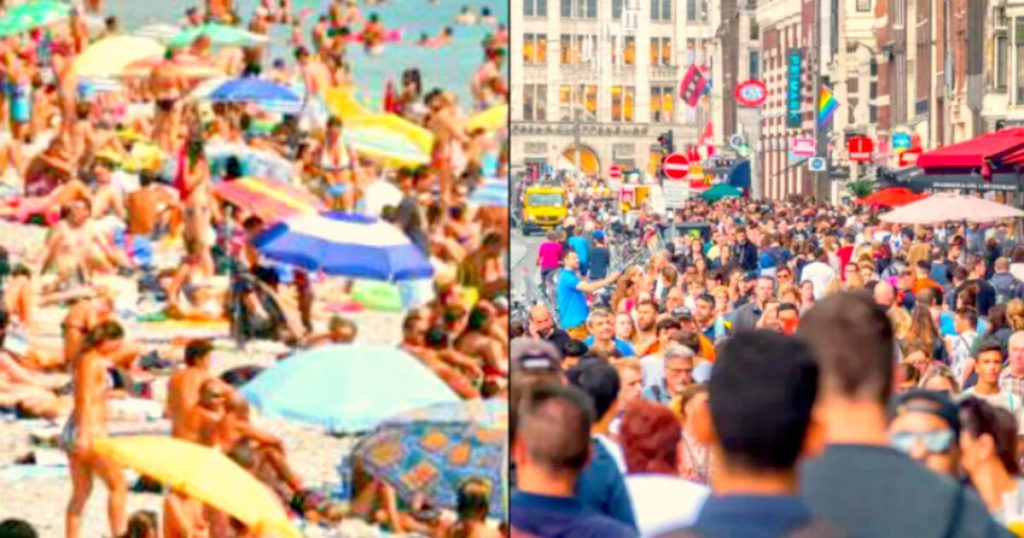Around the world, a myriad of different localities have economies that revolve around tourism. This applies to both rich and developing countries, both warm and cold weathered.
What these places all have in common is that – for better or for worse – the lives of the local communities will be deeply affected by the relentless influx of visitors.
It has now come to the point where many of the most sought-after tourist attractions are becoming over-crowded in a way that is disrupting the life of the locals in an unacceptable way.
So, they are starting to react. These last few days we saw parallel examples from the sunny Spanish Canary Islands and from the northern Netherlands city of Amsterdam.
Different realities, same problem: too many people.
Canary Islands.
It’s been reported that thousands of people protested today (20) in Tenerife, in the Spanish Canary Islands, situated along the coast of North Africa.
The locals are calling for limits in tourist arrivals, and also want to stop a boom in short-term holiday rentals and hotel construction that is driving up housing costs for them.
Reuters reported:
“Holding placards reading ‘People live here’ and ‘We don’t want to see our island die’, demonstrators said changes must be made to the tourism industry that accounts for 35% of gross domestic product (GDP) in the Canary Islands archipelago.
‘It’s not a message against the tourist, but against a tourism model that doesn’t benefit this land and needs to be changed’, one of the protesters told Reuters during the march in Tenerife’s capital, Santa Cruz de Tenerife.
Smaller marches were held elsewhere in the island group and other Spanish cities, all of them organized by about two dozen environmental organizations ahead of the peak summer holiday season.”
The protestors want a limit on visitor numbers to diminish pressure on the islands’ environment, infrastructure and housing stock.
They also want to enact curbs on property purchases by foreigners.
“‘The authorities must immediately stop this corrupt and destructive model that depletes the resources and makes the economy more precarious. The Canary Islands have limits and people’s patience too’, Antonio Bullon, one of the protest leaders, told Reuters.
The archipelago of 2.2 million people was visited by nearly 14 million foreign tourists in 2023, up 13% from the previous year, according to official data.”
Amsterdam.
Meanwhile, thousands of miles away, at the northern coast of Europe, the Netherlands capital city of Amsterdam is banning the construction of new hotel buildings in its latest move to curb over-tourism.
The Dutch city is also establishing limits to the number of overnight stays by tourists.
Euronews reported:
“‘We want to make and keep the city livable for residents and visitors’, the local government said in a statement.
‘This means: no over-tourism, no new hotels, and no more than 20 million hotel overnight stays by tourists per year’.
Authorities also announced a limit on river cruises as part of the bid to reduce visitor numbers.”
The new rules state that construction of a new hotel in Amsterdam will only be allowed if another structure closes.
Amsterdam’s authorities also cut the number of riverboat cruises that enter the capital, reducing them from 2,300 vessels to some 1,150.
“This restriction would slash the number of tourists visiting Amsterdam by about 271,000, according to national news site Dutch News.
Cruises are particularly disruptive during the spring bulb season when some 1,000 of them anchor in Amsterdam, city finance chief Hester van Buren told Dutch News.
‘I am not saying this is going to solve the problem of too many tourists’, Van Buren said during a presentation of the plan this week.
‘But we are not going to divide tourists up into good and bad. This is one of a string of measures to reduce the number of tourists in total. It is about the overcrowding and the coaches parked all over the pavements’.”
The ongoing drive against over-tourism in Amsterdam has also seen its tourist tax hiked, marijuana banned in the red light district and tours of sex workers’ windows prohibited.
Read more about curbing tourism:
NOT AN AMUSEMENT PARK: Japanese City of Kyoto Bars Tourists From Popular ‘Geisha District’
The post From Sunny Spanish Islands to a Dutch City by the River, European Communities Are Mobilizing Against Over-Tourism appeared first on The Gateway Pundit.







